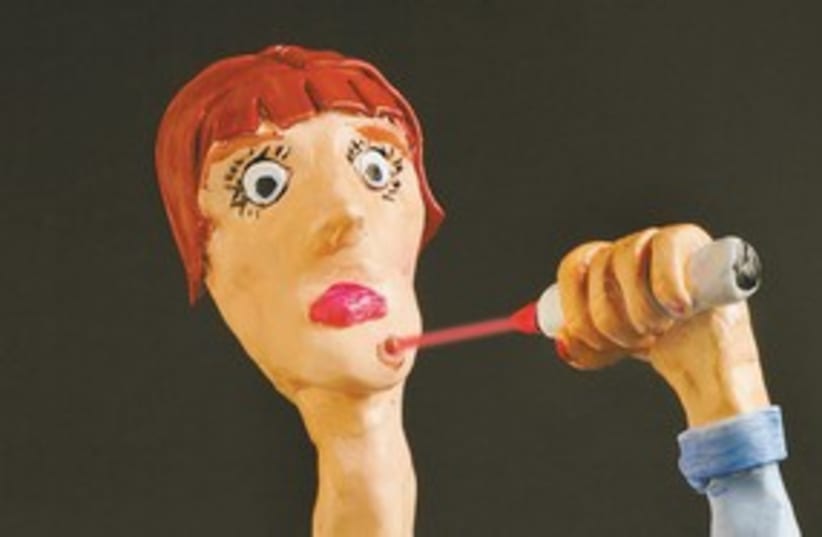Before and after I have my period, the pimples grow and are itchy. I never encountered this problem in the Philippines. I feel ugly. What soap or pill or cream should I use to get rid of it? W.S., via e-mail.
Dr. Julian Schamroth, a veteran Jerusalem dermatologist, replies: Pimples, or acne, is the most prevalent ailment occurring in adolescents, with up to 98 percent of them suffering from this disorder at some time in their adolescence. Although most common in teenagers, it can occur in adulthood and even in infants. It affects all races and occurs in all climates. Acne may be caused by several factors including genetic factors, hormonal factors, stress and occasionally by exposure to certain drugs or chemicals.Many women find that their acne worsens during the time of their menstrual period or during pregnancy. Occasionally, acne is associated with an underlying disease.Dietary factors are unlikely to play a major part in the development of acne, and there is no proof that eating chocolate or nuts plays a contributing role. In fact, acne lesions take about a month to reach the skin surface, as they mature from deep in the skin, so typical stories of “I ate some chocolate, and the next day I had pimples” do not relate cause and effect.Incidentally, there were many reports about the absence of acne in the Inuit (Eskimo) population, which may be due to a persistently high intake of vitamin A (from fish and seal meat) from childhood. However, due to their more Westernized diet today, acne in the Eskimo population is beginning to appear, so there might be some yet-unestablished link between acne and diet.A word of warning: Despite the possible association between vitamin A intake and the absence of acne, it is not recommended that acne patients take high doses of vitamin A. It will not cure their acne. and it may cause a disorder called hypervitaminosis A.The cleanliness of the skin (or lack thereof) is also not believed to be a major factor in acne; excessive washing, the use of rough sponges and applying the myriad range of facial washes available are unlikely to result in much improvement.Acne usually affects the face, but can affect the chest, the back and the buttocks. It is has a wide spectrum of appearances including a greasy skin, comedones (blackheads), pustules (whiteheads), redness, nodules and cysts.Severe acne may leave permanent, unsightly scars. In dark-skinned people, acne lesions often heal by leaving deeply pigmented marks (post-inflammatory hyperpigmentation), which often take a long time to resolve.Although acne is not usually a major health problem and will in most cases pass with time, it does cause severe stress and anguish, as well as social and psychological problems.It is difficult to know what triggered your acne since you arrived here, but stress could be involved.Patients with acne should see a dermatologist who will determine the type of acne, exclude possible underlying factors and decide what treatment is best for the patient.There is a wide range of treatments available, ranging from mild cleansers, lotions and peeling agents to topical antibiotic creams and retinoids. For severe acne, oral antibiotics, cortisone or isotretinoin (Roaccutane) may be prescribed. Other treatments might include intra-lesional cortisone injections, exposure to ultraviolet light and certain types of lasers.Once the acne has been cured, measures can be taken to improve any residual acne scars.Someone in my family suffers from disabling migraines that are getting worse and more frequent. Pain-relieving medication doesn’t work anymore. It’s a terrible affliction. What can be done? L.L., JerusalemProf. Avinoam Reches, senior neurologist at Hadassah University Medical Center in Jerusalem’s Ein Kerem, comments:One can treat the symptoms of migraine with triptan drugs such as Rizalt, Relert and Imitrex. Drugs such a Topamax and Deralin to prevent symptoms can also be taken if attacks occur at least twice a week. Your relative must, of course, consult a neurologist, who will prescribe medications.Rx for Readers welcomes queries from readers about medical problems. Experts will answer those we find most interesting. Write Rx for Readers, The Jerusalem Post, POB 81, Jerusalem 91000, fax your question to Judy Siegel-Itzkovich at (02) 538-9527, or e-mail it to jsiegel@jpost.com.
